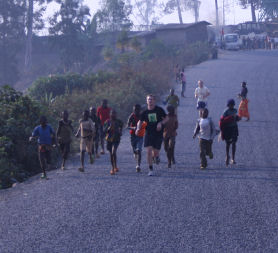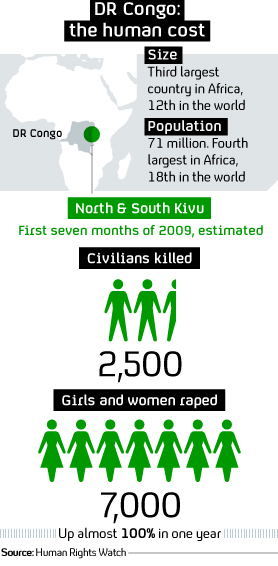Congo – The ‘invisible’ conflict
They turned one woman’s children into cannibals, shot her husband and son and then raped her. Here, Chris Jackson writes for Channel 4 News on the tragic stories he’s heard while in the Congo.

Earlier this week I returned from running the first ever marathon in the Democratic Republic of Congo â?? dubbed by some as the world’s most dangerous marathon.
Those who knew about the Congo said I was crazy but this week’s latest revelations about mass rape carried out under the noses of the UN in the eastern DRC is just one powerful reason why we cannot allow this conflict to remain invisible.
A fortnight ago I travelled to eastern Congo with the aim of running a marathon and more importantly speaking with the people who have been caught in this ‘silent war’.
What I heard and saw was shocking and I am still trying to get over it. I am not sure I ever will.
Thanks to support from the charity Women for Women International I was able to meet victims of the war and hear first-hand their stories.
The women who have been attacked by rebels and soldiers are
like any other women. They are house-proud and they watch their weight.
They appear strong, proud and determined. Itâ??s only when you
talk to them about their experience that you notice the change. They
were haunted by what had happened to them.
Their hands would shift under shawls; eyes would flare up and
bulge with tears. For a few of the women when they talked through their
account of rape or violence they’d rub or touch an injury that they had
sustained during the attack.
One lady explained to me what had happened to her and her family. It moved me to tears.
One evening militia arrived at her door demanding food, so she fed them and offered them all the money she had out of fear. Not content with this the militia went and shot her husband. They then came back to the kitchen and pinned down the woman, took a knife to her thigh and sliced off skin and flesh and then cooked it over the fire.
The militia forced her children to eat their mother’s leg. When one brave child refused to do this and said “You’ve killed my father you hurt my mother I’m not eating it,” they shot the child in the head in front of the mother.
Then they raped her.
This was not a one-off. I spent time chatting with a doctor at Panzi Hospital, just outside of Bukavu in eastern Congo, which specialises in dealing with victims of rape and sexual violence.
The doctor explained the horrors that have occurred to women, children and increasingly men as the conflict rages on. The hospital is seeing an increasing number of rape victims coming through its doors, some victims often arrive with wooden sticks or broken glass bottles stabbed into their genitals.
Because of the skills of the staff at the hospital the physical injuries can often be fixed.
It is the mental scars and social stigma that continue to haunt the victims, which is what makes rape such a powerful weapon.
It leaves women scared and afraid of going home, fearing the shame and stigma or future reprisals. Often the idea of returning to a family home now empty of loved ones is too much to bear.
Congo: the forgotten conflict
I recently walked round central London asking people for their thoughts on the DRC, after all it's the size of Western Europe so not insignificant, right? I was met by blank faces or a non-too-sure "It's in Africa, yeah?"
It is estimated that nearly 6 million people have been killed since 1998 - more than any conflict since WWII. This week's news of over 150 women being raped and gang raped is shocking, but nothing new; more than 10,000 people were estimated to have been attacked last year in the Kivu region of the DRC alone, the actual figure is likely to be much greater.
Despite these atrocities the conflict barely registers on our radar. Yet the conflict remains almost invisible to the West. In 2007, Nicholas Kristof, a journalist for the New York Times, claimed that the war had been allocated "fewer column inches per million deaths than any other recent war."
That is why I have been trying to engage the UK public with what is happening. I've set up a blog and am running a marathon in every month of 2010.
It's a lot of small steps but I hope they will add up to something.
The weapon of rape is proving more effective than the barrel of the gun. It has the power to kill off communities, ostracise women, destroy families and tear the fabric that holds Congolese society together.
The militia knows such attacks disperse families and destroy morale. It will continue to be used in eastern Congo as a weapon because, from what I have seen and heard, it works.
The DRC has lost three generations to the conflict. This must be stopped. Every lady I spoke to had the same concern and that was the future of their children.
We owe it to them for what they have had to go through to make sure that in the future people are protected from such brutality.

The question many here in the UK will ask is ‘What can we do?’ Many
people remain unaware that the violence in the DRC is linked to mineral
deposits. Tin, tungsten and coltan are all found in abundance in the
country’s east; they are found too in our mobile phone handsets.
Many of us carry a piece of the Congo in our pocket but we don’t have a clue how it got there.
I’m going to be working over the coming months to share the stories I heard from the women of the Congo. You can follow my blog or follow me on Twitter.
The UK is already an established donor, spending £173 a minute
trying to keep the peace but this week’s news and my own experiences are
compelling evidence that this is nowhere near enough.
We must stand up for these people and allow them to build their
own lives free from fear and insecurity. Too much is said about how
difficult that might be and not enough about how to do it. I want to
start that debate.
One thing is for certain and that is that the people of the
Congo want to see their country realise its potential. I asked one lady
what Congo would be like if the conflict stopped, she paused and said
“Paradise”.
Chris Jackson can be contacted at www.runforcongo.wordpress.com or via Twitter www.twitter.com/run4congo